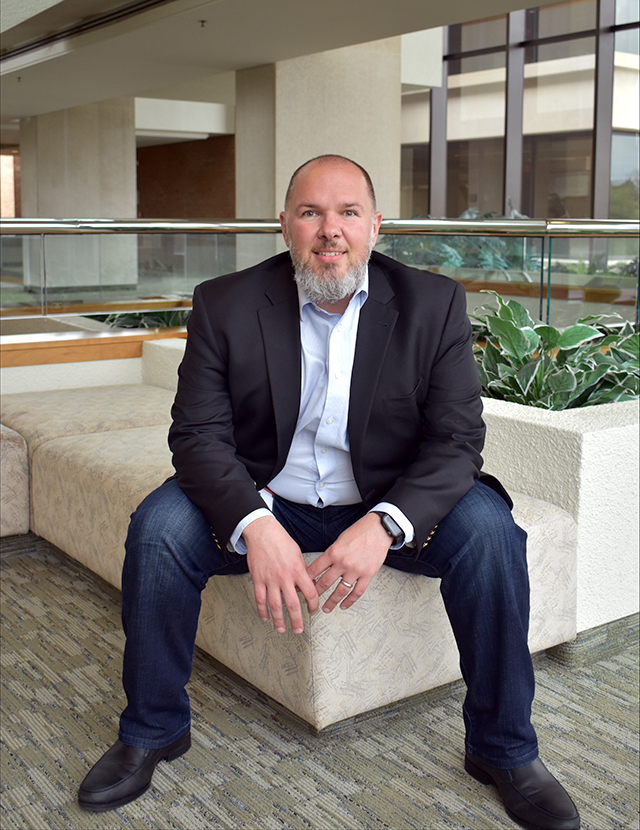Click. Click. Click. Brian Whitlock heard the sound all day long. Click. Click. Click.
As one of the more junior staff in the lab at Covance, the major life sciences company now known as Labcorp Drug Development, Whitlock was assigned the most basic job. He was hired as a genetic and molecular toxicologist and spent every day culturing cells and counting them under a microscope for hours on end. Each day, he peered through an ocular lens with a clicker in his hand counting.
Whitlock estimates that he pressed the clicker button “at least a million times.” It wasn’t exciting work. But, while other students and recent graduates were working at the mall or taking other random part-time or entry-level jobs, he was paying his dues and putting himself in proximity to the people who could help him achieve his goal of building a career in life sciences.
The strategy paid off. Before long, Whitlock’s dedication and perseverance earned him the trust of his more senior colleagues. He made his ambitions clear, asked for more work, and slowly learned how to run and maintain the lab he was working in. “Doing the basic jobs and the dirty work was an asset because it led to me becoming a more complete lab technician and a well-rounded scientist,” Whitlock says.
Whitlock, the current vice president and head of global procurement research and development (R&D) at Bristol Myers Squibb (BMS), is a twenty-three-year veteran in his industry.
“We are always looking to spot any opportunities or challenges that may impact Bristol Myers Squibb so we can respond in a way that ultimately lets us get medicine to patients faster.”
Brian Whitlock
In the role that he’s held since 2017, Whitlock engages R&D leadership and his counterparts to help the nearly $50 billion corporation create and implement innovations in sourcing to meet its mission-critical strategies.
One thing has remained constant over the past two-plus decades: his passion for ongoing education. “I’m very inquisitive. I’m curious, and I always want to learn something new,” Whitlock says.
The approach set him on the fast track after he left his clicker behind. Whitlock took a role outside of the lab as a quality assurance administrator to build relationships and understand other groups in the organization. In just eighteen months, he built key relationships with other scientists and seized the opportunity to get to know study directors, lab managers, and others. Then, leaders tapped him on the shoulder to serve as the principal scientist for an analytical group. It was a major task for someone who had earned a degree in biochemistry just a few years earlier.
His rise continued from there. Whitlock soon found himself managing Covance’s important relationship with Amgen and moved across the country to manage scientific services for that company in 2009. By the end of his five-year tenure with Amgen, he learned business strategy, helped shape an organization, honed his influencing skills, and learned the ins and outs of procurement.
By February 2015, Whitlock was ready for a change and joined BMS to develop new sourcing solutions. Now, he leads seventy sourcing professionals across North America, Europe, and Asia, who together manage nearly $3 billion of spend annually.
While drug development is complex, Whitlock easily explains his team’s impact. “Our job is to look around the corner and be proactive,” he says. “We are always looking to spot opportunities and/or challenges that may impact Bristol Myers Squibb so we can respond in a way that ultimately lets us get medicine to patients faster.”
Procurement leaders may specialize in looking around the corner, but none could have fully predicted the lasting impact of COVID-19. “Companies are always having to change, but we have faced more threats over a shorter period of time than in any previous era,” Whitlock says of the pandemic.
BMS’s R&D teams are headquartered in New Jersey with sites in Boston, Seattle, San Francisco, San Diego, Europe, India, and elsewhere. The pandemic forced Whitlock and his colleagues to find ways to ensure employee safety and serve patients at the same time. They invested in key partnerships to share information and even collaborate with competitors.
Organizations are now navigating ongoing challenges related to changing legislation, inflation, and geopolitical strife. These issues compel Whitlock to find innovation from other companies and other industries.
The push comes as BMS has announced a company-wide transformation designed to diversify its product lineup, introduce new medicines, and quicken its product pipeline. Whitlock’s main goal is to simplify the complex work that BMS does. “Procurement enables the business, and we have to spend the company’s money on the greatest value-added opportunities,” he says.
“Me and my team do what we do because we know that there are people out there that depend on us each and every day.”
Brian Whitlock
Whitlock points to two big projects that will help him achieve that goal. First, he helped identify a new opportunity in Hyderabad, India, where BMS is investing into a new life sciences center for IT and drug development. The move will help the company tap into a region seeing 1.5 million life sciences students graduate each year.
Second, the BMS procurement team is working with Thermo Fisher Scientific and R&D procurement technology company Science Exchange to create more “Amazon-style buying experiences” for its scientists. These simple, digital on-demand e-procurement ordering systems enable speed to science and help improve the overall buying experience for its scientific teams.
“We’re thrilled to partner with Brian and BMS to streamline and modernize how R&D organizations purchase goods and services,” says Dr. Elizabeth Iorns, CEO and cofounder of Science Exchange. “Brian shares our vision to transform outdated and time-consuming procurement processes into an automated, consumer-like experience, enabling scientists faster access to essential resources for advancing their research.”
When Whitlock got into the industry, he had no idea how much it would hit home. He was just one year into his career when his mother was diagnosed with non-small cell lung cancer. She passed away just six weeks later.
Today, patients like her face better outcomes. “I get to come to work each day knowing that what this company does may prevent another family from going through the awful experience my family had twenty years ago,” Whitlock says. “Me and my team do what we do because we know that there are people out there that depend on us each and every day.”
Science Exchange is the first supplier orchestration platform for life sciences companies. We’re on a mission to modernize the way R&D organizations work with suppliers so that scientists can focus on what they love doing most—science.
We simplify purchasing, supplier management, and payment processing enabling scientists to purchase the services and goods they need when they need. Our automated approval workflows and guided buying drive operational efficiencies and cost savings.
The world’s top life sciences companies, including BMS, Merck, AbbVie, Gilead, and Astellas, rely on Science Exchange to help simplify their procurement, automate manual processes, and advance their programs faster.



